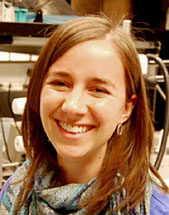
Biology and Psychology Major
Graduate student in Karl Deisseroth's lab at Stanford University
Current projects
I am currently working on two projects for my Ph.D. In my primary project, I am studying how dopamine signaling
changes risk preferences. To answer this question, I am placing light-sensitive
proteins into the brain cells that sense dopamine, which allows me to control
those cells' activity with light! Using this technique, called optogenetics, I
can determine where these cells intervene in the decision-making process. In my second project, I am studying how dopamine alters the brain's activity in fMRI. fMRI is a technique used to image the activity in human brains. This technique is used in psychology and neuroscience laboratories all around the world, but scientists don't really understand what the fMRI signal means. Using optogenetics, we are stimulating the dopamine cells directly, allowing us to measure how their signaling impacts the signal we detect in the fMRI scanner.
Undergraduate Research
During my time at Hendrix I worked on two projects with Dr. Jennifer Penner in the Psychology department. In the first project, our animal behavior class tested whether site provisioning, a generally accepted practice in the study of cache pilfering, artificially increases cache theft among eastern grey squirrels. Rate of cache disappearance was significantly higher in sites that had been provisioned, indicating a need to reevaluate past research on scattercaching. I also worked with Dr. Penner to test whether the squirrels' typical intercache distance for pecans supported a hypothesis for coevolution between eastern grey squirrels and pecan trees. While at Hendrix I also worked with Dr. Matt Moran on a field ecology experiment to test the effect of armadillos on the forest floor arthropod community, and I participated in an NSF-funded summer research experience in the Animal Behavior program at Indiana University.
How Hendrix prepared me for success
While I was studying at Hendrix, I took advantage of potential research experiences both at Hendrix and at larger universities, and I also participated in the Odyssey Program. The work I did at Hendrix in ecology and animal behavior gave me a sense both for the dedication research requires and for the rewards of discovering something new. It also gave me a unique perspective entering a Ph.D. program in neuroscience. Even as the most-junior student in the lab, I could provide helpful insights about animal training and about the potential benefits of choosing ethologically-relevant tasks. Through the Odyssey Program, I was able to travel to the American Southwest, to Rwanda, to Costa Rica, to the northern reaches of the Amazon rainforest, and to farmlands of south-central China. Each of those experiences is difficult to condense into a riveting tale or pithy phrase. The collective experience, however, taught me that I can reach distant goals. It taught me that, sometimes, you are truly helpless in the moment, but that through patience, persistence, and the occasional kind stranger you can survive just about anything. And it gave me a broader perspective than many other graduate students, even (...especially?) those Ivy League types.
Future plans
I will be graduating with my Ph.D. in early 2015. I am hoping to
put my scientific expertise and data analysis skills to work in science
education and sustainability. I am not sure yet whether I want to pursue
academic research or whether I will pursue a position in a private company or
non-profit.
My advice
Hendrix is overflowing with opportunities to experience and to change the world around you. You can improve a life through research or volunteering, broaden your perspective through arts and travel, and change the community with your leadership. Don't sit idly while these opportunities pass you by.